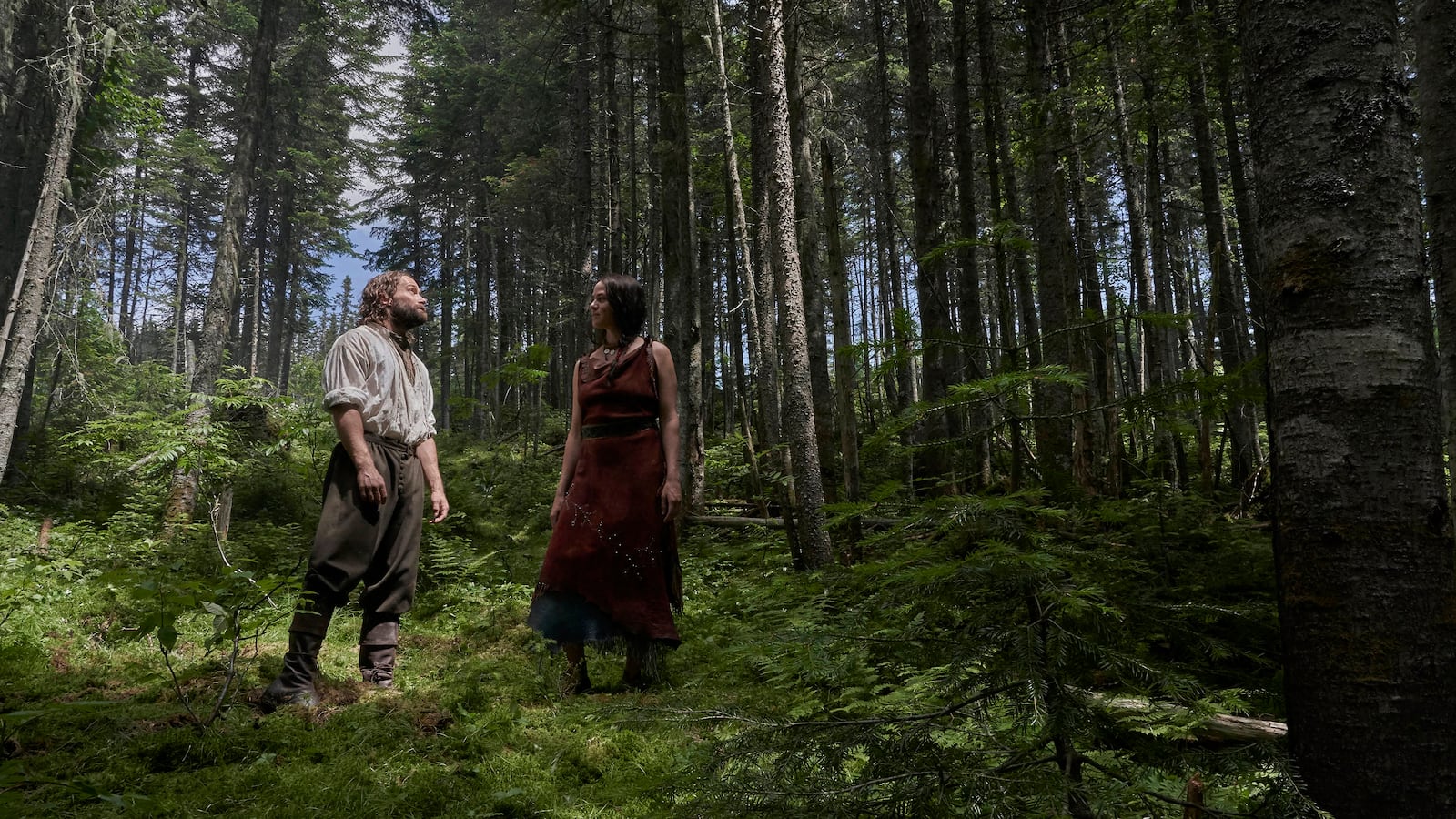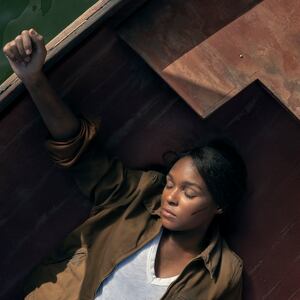Frontier life was tough as hell, and for further proof of that fact, look no further than Barkskins, National Geographic’s small-screen adaptation of the epic 2016 novel by Annie Proulx (Brokeback Mountain). Set in the 1690s, this multifaceted tale concerns the arrival of two men in New France, the northern North American territory under the rule of King Louis XIV, and a wild stretch of wilderness that’s anything but tamed. It’s a story of hope, greed, ambition, ruthlessness and intrigue, and over the course of its eight episodes (premiering May 25), it slowly but confidently develops into a fascinating drama about the battle fought between nations and tribes, disparate individuals, and within each person’s heart.
Proulx’s novel is too expansive to be faithfully condensed into eight hours of TV, and thus Barkskins is not a miniseries but rather the beginning of a multi-season endeavor, replete with an exceptional first season cliffhanger. The journey to that ending, however, is itself exceedingly engaging, and begins with two French criminals who, in lieu of prison sentences, have agreed to be shipped to New France to work as indentured servants. René Sel (Christian Cooke) is a noble and stout hunk who believes that, through faithful service to his master, he will earn his freedom and the land to start his own family. Charles Duquet (James Bloor), meanwhile, is shady thief with a rotten tooth that speaks to his corrupt willingness to do whatever it takes to survive.
On their way into the New France outpost of Wobik (in what’s now Quebec), Sel and Duquet pass a tree decorated with the dead bodies of Iroquois warriors—a sign of the discord that ravages this area, and an omen for the cataclysms to come. As we soon learn, the Iroquois have been strung up by Wobik’s Captain Bouchard (David Wilmot) for having recently committed a massacre at a nearby settlement. An early conversation between Wobik’s barrel-trading impresario Elisha Cooke (Thomas M. Wright) and his lackey Lafarge (Matthew Lillard), though, immediately reveals that the Native Americans weren’t the true masterminds behind this tragedy. Rather, it was this duo that orchestrated the slaughter, and Cooke—an Englishman who still grieves his late French wife—is now worried about the disappearance of James Cross (Andreas Apergis), a fellow English conspirator who helped carry out the crime.
As Cross was an employee of Hudson’s Bay Company, the outfit sends a new man to Wobik to find him: Hamish Goames (Aneurin Barnard), a pale-faced specter with intense eyes and a no-nonsense demeanor who, in his black hat and matching coat, resembles a cross between Clint Eastwood and My Chemical Romance frontman Gerard Way. Goames is accompanied by his equally stern Native American compatriot Yvon (Zahn McClarnon), whom he treats as an equal, and their investigation is almost instantly complicated by the discovery of a young female survivor (Lola Reid) from the massacre. The girl is taken in by local innkeeper Mathilde (Marcia Gay Harden), who‘s still mourning the loss of her only daughter, and, along with her husband Francis (Adrian Hough), has her own clandestine ties to Lafarge.
Under the stewardship of showrunner and head writer Elwood Reid and director David Slade (who helms its first two installments), Barkskins establishes its intricate Wobik dynamics assuredly, even as it maintains focus on Sel and Duquet, who fall into the employ of Claude Trepagny (David Thewlis), a wealthy quack who lives on his forest estate with Native American housekeeper and romantic partner Mari (Kaniehtiio Horn), with whom he has a child. Looked at with wary eyes by his fellow frontiersmen for his unconventional religious views and baroque disposition, Trepagny is a tough but fair master. As embodied by Thewlis, he’s the colorful soul of the series, providing it with larger-than-life flair while simultaneously remaining a three-dimensional character—one whose own dreams and desires quickly cause friction in his home, thanks to both the unruliness of Duquet and his own eventual aim to find a proper French wife.
Weaving various strands into an expertly-threaded whole, Barkskins also involves a group of French women who’ve been transported to Wobik to marry its settlers and help populate the new continent. In single-minded Melissande (Tallulah Haddon), who’s determined to procure a wealthy spouse she can control, and insecure Delphine (Lily Sullivan), who’s desperate for acceptance, the series conveys the harshness of this reality from a distinctly female perspective. That angle is complemented by the travails of Mathilde, here brought to full-bodied life by the sterling Harden. Cunning and compassion, determination and deference, are all demanded by these difficult circumstances. And the more it intertwines its main figures, the more the story develops into a complex view of the myriad forces at play in a fledgling society—especially one wracked by political tensions with both the Native population and, just as crucially, another imperial power intent on staking a claim to this territory.
Save for a minor Trepagny-related thread, Barkskins’ first season doesn’t really capture the environmentalist bent of Proulx’s book. Even so, it improves with every episode, in large part because its performances become richer the more they’re given time to develop, and breathe. Chief among them is Barnard’s turn as Goames, which is so mysteriously severe, and so perfectly paired with the excellent McClarnon’s blunt Yvon, that one can already imagine them shouldering their own spin-off series, traipsing through the North American wilderness and enjoying rugged Josey Wales-style adventures. Such fantasies aside, they’re expertly integrated into the show’s big picture, which expands at a natural and compelling pace, developing greater stakes for the future of Wobik and its many inhabitants and visitors.
By the time it reaches its finale, treachery has reared its head in various corners of this North American station, replete with underhanded schemes concocted by the British and Iroquois, and self-interested duplicity and disloyalty exhibited by those—be they men or women—looking to solidify their own positions. Casting all of its characters in shades of gray, it’s a saga of the good and evil required to create and sustain civilization, and an impressively promising start to what promises to be a long-running must-see TV affair.


